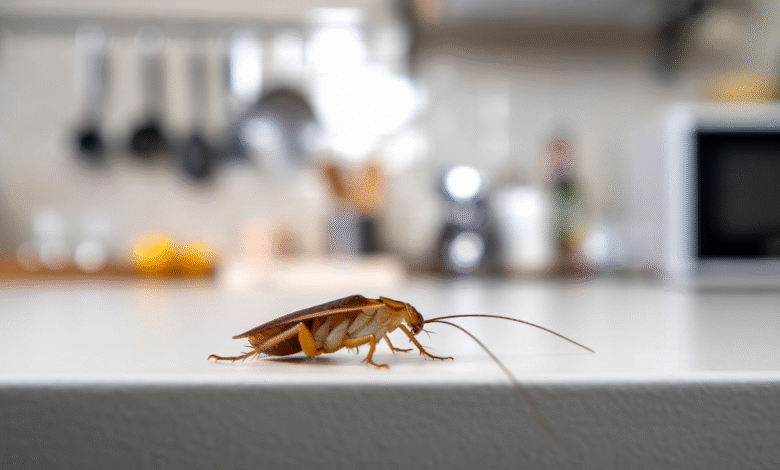Can Roaches Bite? Here’s What You Need to Know About These Creepy Crawlies

Can roaches bite? Many people see these little bugs scurrying in kitchens and bathrooms and wonder if they can actually harm humans. The truth is, while roaches usually avoid humans, they can bite in certain situations. If a home has a large roach infestation and food is scarce, roaches might nibble on exposed skin. Most bites are small, often leaving a tiny red mark or a mild itch. Roaches are not aggressive predators, but their bites can feel uncomfortable. Understanding when and why roaches bite helps homeowners protect themselves and keep their homes safer.
Can roaches bite and cause health problems? Yes, but it is rare. The bites themselves are not dangerous like a spider or mosquito bite, but scratching them too much can cause irritation or infection. Roaches can carry bacteria on their bodies from garbage or dirty areas, which makes keeping your home clean very important. Preventing bites is mostly about stopping infestations early. Using traps, sealing cracks, and keeping food covered can make your home less inviting. Learning about roach behavior helps you know what to watch for, how to treat bites if they happen, and how to keep your home roach-free.
Why Can Roaches Bite Humans?
Roaches usually do not bite humans because they are shy and like to hide in dark places. However, they can bite when food is hard to find or if there is a big infestation in your home. They might nibble on skin, especially fingers, toes, or hands, if a person is sleeping or if the roach is cornered. Most roach bites are not dangerous, but they can leave small red marks or cause itching. The chance of getting bitten increases if homes are messy, with open food or unclean areas that attract more roaches. Knowing why roaches bite helps you understand their behavior and take steps to keep your home safe and clean. Keeping your home free of clutter and sealing cracks can reduce the risk of bites.
What Does a Roach Bite Look Like?
A roach bite usually appears as a small red bump on the skin. Sometimes it can be itchy or slightly swollen, similar to a mosquito bite. The bites are usually tiny because roaches have small mouths and cannot chew deeply. Most bites do not cause serious problems, but scratching them too much can lead to infections. Some people may have mild allergic reactions, which make the skin redder or a bit irritated. The bites can appear anywhere on the body, but fingers, hands, and feet are the most common spots. Knowing what a roach bite looks like helps you tell the difference between bites and other insect bites, so you can treat them properly and avoid infection.
Can Roaches Bite Babies or Pets?
Roaches can bite babies or pets if there is a large infestation and they cannot find other food. Babies and small children are more likely to get bites because they spend more time on the floor and have soft skin. Pets, especially dogs and cats, might also get small bites around their paws or nose if they come into contact with roaches. While bites are usually not dangerous, they can cause redness, swelling, or irritation. It is important to keep floors clean, store pet food properly, and make sure babies’ play areas are free from bugs. Taking action quickly can protect children and pets from bites and reduce the chance of infection or discomfort.
How to Treat Roach Bites Safely
Treating roach bites safely starts with cleaning the area with soap and water. This helps remove any dirt or bacteria that could cause infection. After washing, you can apply a cool compress to reduce swelling and itching. Aloe vera gel or a mild hydrocortisone cream can also soothe the skin. Avoid scratching the bite because this can make it worse or lead to infection. Keep an eye on the bite for signs of redness spreading or increased swelling. If symptoms get worse or the bite seems infected, it is best to see a doctor. Following simple treatment steps helps the bite heal faster and keeps your skin healthy.
Tips to Stop Roaches From Biting
Stopping roaches from biting starts with keeping your home clean. Make sure food is stored in sealed containers and crumbs are wiped up right away. Take out the trash regularly and clean areas where roaches like to hide, such as behind appliances or under sinks. Seal cracks and holes where roaches can enter. Using traps or safe insecticides can help reduce the number of roaches inside. Regularly checking for signs of infestation and acting quickly if you see roaches can prevent bites. Teaching everyone in the house to clean up after themselves is also important. These tips reduce roach activity and make your home safer and more comfortable.
Signs You Have a Roach Infestation
A roach infestation shows up in many ways, including seeing live roaches, especially at night. Another sign is tiny black droppings in corners, cupboards, or near sinks. You might also notice a strong musty smell in rooms where roaches are hiding. Egg cases or shed skins are further evidence of a growing population. Roaches like warm, dark, and damp areas, so check kitchens, bathrooms, and basements closely. Recognizing these signs early helps you act fast before the problem gets worse. Early detection can prevent bites, reduce health risks, and make it easier to get rid of roaches completely.
Do Roaches Spread Disease Through Bites?
Roaches do not usually spread diseases through bites like mosquitoes or ticks. Their bites are mostly small and only cause minor irritation. However, roaches can carry germs and bacteria on their bodies from trash or dirty surfaces. If a roach walks on food, dishes, or countertops, it can spread germs that cause illnesses. Keeping your home clean, washing hands, and storing food safely are key to preventing health problems. While roach bites themselves are not a major risk, the germs they carry make hygiene very important. Controlling roach infestations reduces the chance of both bites and bacteria spreading.
Conclusion
Roaches can bite humans, but it usually only happens when food is scarce or there is a big infestation. Most bites are small and not dangerous, but they can itch and cause mild redness. Keeping your home clean and storing food safely is the best way to avoid bites.
Watching for signs of roaches, like droppings or egg cases, can help stop bites before they happen. Treat bites with soap, water, and a cool compress if needed. By acting early, you can keep your home safe, healthy, and roach-free.
FAQs
Q: Can all roaches bite humans?
A: Most roaches do not bite, but they can if food is scarce or there is a big infestation.
Q: Are roach bites dangerous?
A: Roach bites are usually not dangerous but may cause itching or mild redness.
Q: How can I prevent roaches from biting?
A: Keep your home clean, seal food, take out trash, and block entry points.
Q: Can roaches bite pets or babies?
A: Yes, in large infestations, roaches might bite babies or pets, but bites are usually mild.
Q: Do roaches spread disease through bites?
A: Bites rarely spread disease, but roaches can carry germs on their bodies, so hygiene is important.




